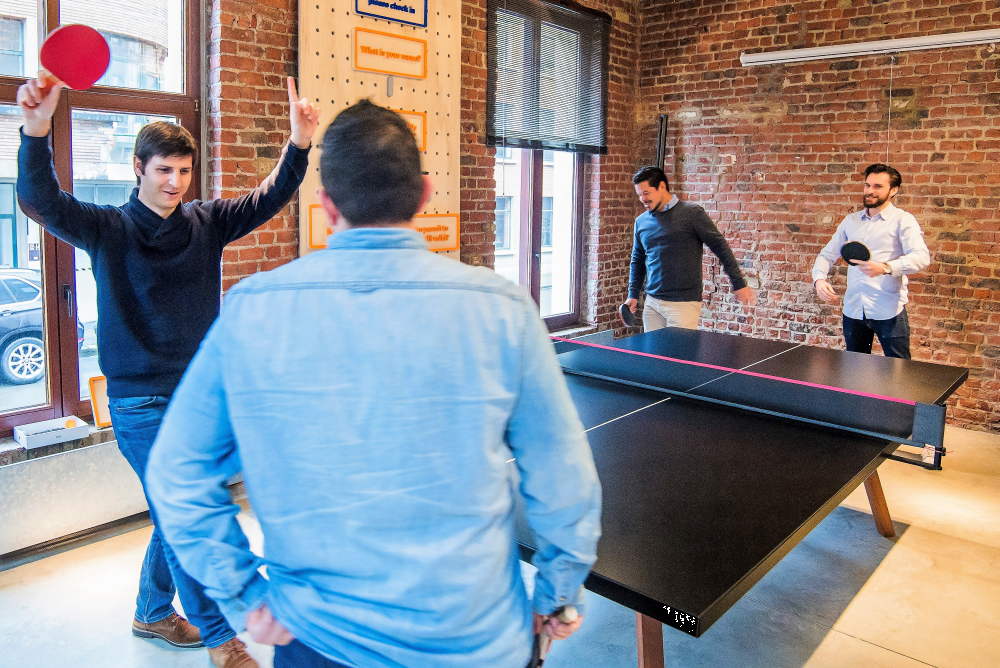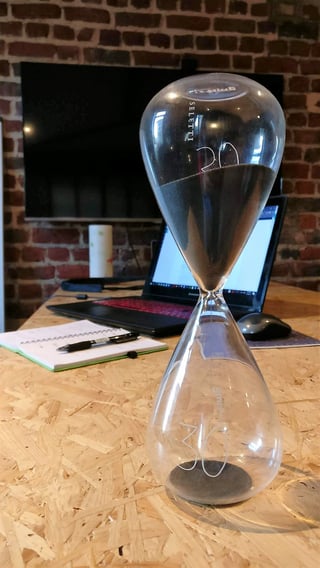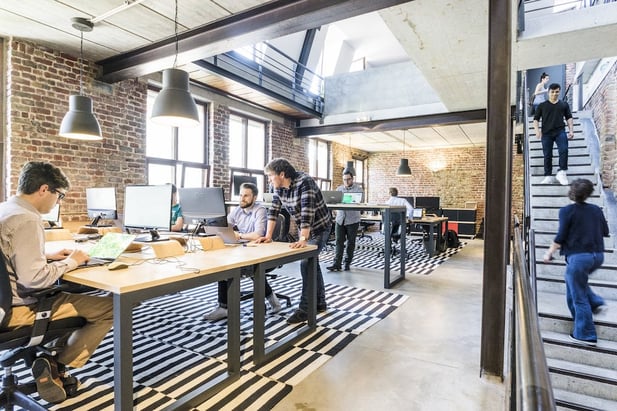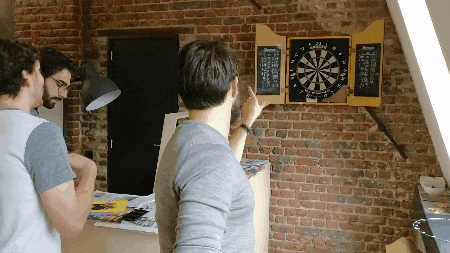How to boost your productivity without apps

Apps were in the focus of our last Workplace Stories blog post, but it got us thinking: are apps really be-all-end-all of how we can boost our productivity in workplace? How did we ever get anything done before the apps proliferated into every corner of our professional (and private) lives? Can it still be done?
Indeed, apps are all around us - in work and in our free time - and they can truly help us do so much more in far less time, functioning as a virtual extension of our minds.
Perhaps you’re a property manager with a portfolio of office buildings who needs to check the rent payment status of all tenants at a glance - worry not, there are several apps for that.
Or you might be working in facility management and need a simple solution to give out maintenance work orders. Needless to say, you are covered.
But, at the same time, apps can make us become a little bit too reliant on their help, in turn leading us to believe we don’t need to do much on our own.
And if you’re not trained to let go of the common urge to put a bow on everything, reacting to every notification and app event can really bite into the valuable - and limited! - time to complete your tasks.
A little more mindfulness and relying on a couple „analog“ ways of raising – and maintaining - your productivity levels can go a long way.
To make it easier for you, we've done the research and compiled some more or less unexpected ways of being more productive without technology - so you don't have to.1. Work in layers
Chances are you're already working in layers, an approach that was brilliantly covered by Jimmy Daly in one of his recent blog posts.
Most of us work on multiple projects of different nature and in slightly different roles during the day.

But we may not be doing it the best way. Rather than „closing“ your attention to other things on your plate, you can glean and take what you need for later, says Jimmy.
For example, here in Proxyclick I might be working on copy for a new mini website dedicated to visitor security.
But, I will use the pieces of information I learn about the way our app helps businesses comply with security standards later, when I'm helping with communicating key benefits in a new series of Google Ads, for example.
Jimmy Daly says - and I can attest - that writing things down helps a lot when you're trying to work in layers.
I make it a habit to write down not just my immediate to-dos and objectives but also little chunks of information and inspiration I acquire during the day.
That way I can have the little flashes of insight ready when I need them. In fact, when I don't write things down, my "gut feeling" soon reminds me something amiss and that I'm at risk of losing valuable information.
I trained myself to do it, so can you.
2. Break in waves
Good news, everyone! It’s been known for awhile but you may have missed it: you can stop feeling guilty about interrupting your work from time to time to check your messages or the news, or social media notifications.

It turns out, you’ve actually been boosting your focus, according to scientists.
The findings of their research revealed that well-timed breaks spent on something unrelated to the task at hand can greatly boost performance.
This is because prolonged exposure to the same stimulus - this spreadsheet or that proposal - can lead to the brain switching off, similar to the way you quickly stop being aware of clothes touching your skin all day.
The key, of course, is not to overdo it and let it completely overtake your time dedicated to work.
So don’t wait too long before decompressing - you can use an hourglass or even a classic kitchen timer to remind you to break in case you become too engrossed in your work easily.
In fact, one break-taking technique is called Pomodoro, after the tomato shaped kitchen timers and typically partitions time into 25 minute chunks, followed by a short break.
(Yes, there is also a very simple online version of the timer, which is the only exception of digital help we will allow in this case *wink*.)
So to paraphrase a well-known adage: if you fail to plan breaks, you are planning to fail!
3. Walk before you can run
Another way to boost your productivity is really an extreme example of taking the analog route: the only thing needed is your two feet.

Taking a walk, even if indoors, is proven to give an immediate boost to creativity - one oft-cited example is Steve Jobs and his beloved “walking meetings”.
In case you’re implementing taking regular breaks as mentioned above (well done!), you might as well double that productivity boost and spend them on taking short walks.
Some businesses even go as far as introduce treadmill desks where people can walk and work at the same time, and guess what - research confirms that this can have a positive effect on attention and memory.
More attention + better memory = better work results.
An immediate example from us at Proxyclick: our office sprawls over three floors of a former neon factory which are connected with a single flight of stairs.
That way, no one has a choice but to get that creativity injection from walking up and down at least a few times a day.
4. Crush procrastination
Procrastination can be a real show stopper. However, it’s also fairly common with about 20% adults procrastinating regularly.

So while you shouldn’t just sit there with crossed arms (or you know, pinning office furniture for an excessive period of time), you also shouldn’t feel too guilty about it.
Good news is there are ways to smash this issue, even if you may have given up on trying or convinced yourself you work best under pressure of a looming deadline, and one of them is called a 2 Minute Rule.
Geoffroy, our Product Owner, sums up this key technique like this: “If a task takes less than 2 min, do it immediately (when it arrives). Just noting it down and remembering it later takes half of the same amount of time.”
A slightly different take on the problem is the 5 Minute Rule, touted by some high-profile CEOs as their go-to technique.
It boils down to this: make a deal with yourself to do an activity for 5 minutes and then you'll end up doing it for an hour.
Or in other words, sometimes the hardest part of achieving something is starting it...
5. Sleep matters…
Bragging about sleeping only 4 or 5 hours last night at times seems to have become something of a badge of honor.

It supposedly paints you as a hardened professional who is so busy that they can’t be bothered to think much about sleeping.
The truth is, short-term you might benefit from a few extra hours in the day, but long-term, each hour of sleep you steal - from yourself - out of the recommended eight hours of sleep, ends up costing you a lot more.
And that cost may come in the form of: weakened productivity, getting more easily distracted, higher risk of burnout, poorer decision-making, being prone to more mistakes...sounds like a real nightmare, doesn’t it?
This is why it’s crucial to not skim over the importance of sleep: without it you’re risking a huge hit to your overall productivity.
6. ...And so does sleeping on it
Speaking of sleep, there’s another benefit at hand.
It provides us with an opportunity to process information from the workday on a more subconscious level and improve our decision-making.
Proof exists that conscious decision-making (and as a result, higher productivity) is actually complemented, and in some cases surpassed, by the unconscious decision-making.
While conscious thought still has no substitute when it comes to making decisions involving calculations and numbers, it turns out that unconscious thought is better at weighing different options for choosing the one with the most positive outcome.
So allowing for enough healthful sleep is an effective way to let this hidden mechanism come into play, with some added benefits thrown in for measure.
Sleep also helps us reset our overburdened short-term memory and moves that information into long-term “storage”.
Next time you need to make a complex choice, allow yourself to step away from it and get distracted with something else - or get a good night's rest - and you will lay the groundwork for making better decisions.
Bonus: darts
I’m sure you didn’t see this one coming, did you?
Well, here in our Brussels office we have an informal agreement that says “When in doubt, play darts”.
You’ll find some of us caught up in a quick darts contest at least once a day at our dedicated darts corner on the top floor.
 Proxyclick boys letting off some steam with darts
Proxyclick boys letting off some steam with darts
Our Business Developer for EMEA, Henry, puts in a few words everything that’s great about it: “It's a great way to relax and chat with colleagues from all the teams, and release some stress if you have any. It's also great to win *smile*.”
So there you have it, you get to take a break, do team building, de-stress AND build self-esteem, all in one package.
Playing darts also helps you develop concentration and primes you to think strategically - all of which you can apply while spell checking that contract or preparing that weekly report.
UPDATE 10 April 2018: Since we wrote this article, the team in Proxyclick has grown and so have our needs for a variety of productivity boosting options. To this end, we have obtained a ping pong table and have daily matches, even keeping track of team rankings on a table we update every day! The effect has been a huge upshot in team cohesion, energy and just all around happiness!
Final Words
So the verdict is in and with a vengeance: we are more than equipped to tackle our productivity even without apps. Surely, dropping the help of apps altogether would be detrimental, but remembering our analog, biological really, ways can lift us to even greater heights - provided we use all of this in equilibrium.
What analog ways of boosting your productivity would you recommend? We encourage you to share your thoughts in the comments below!


